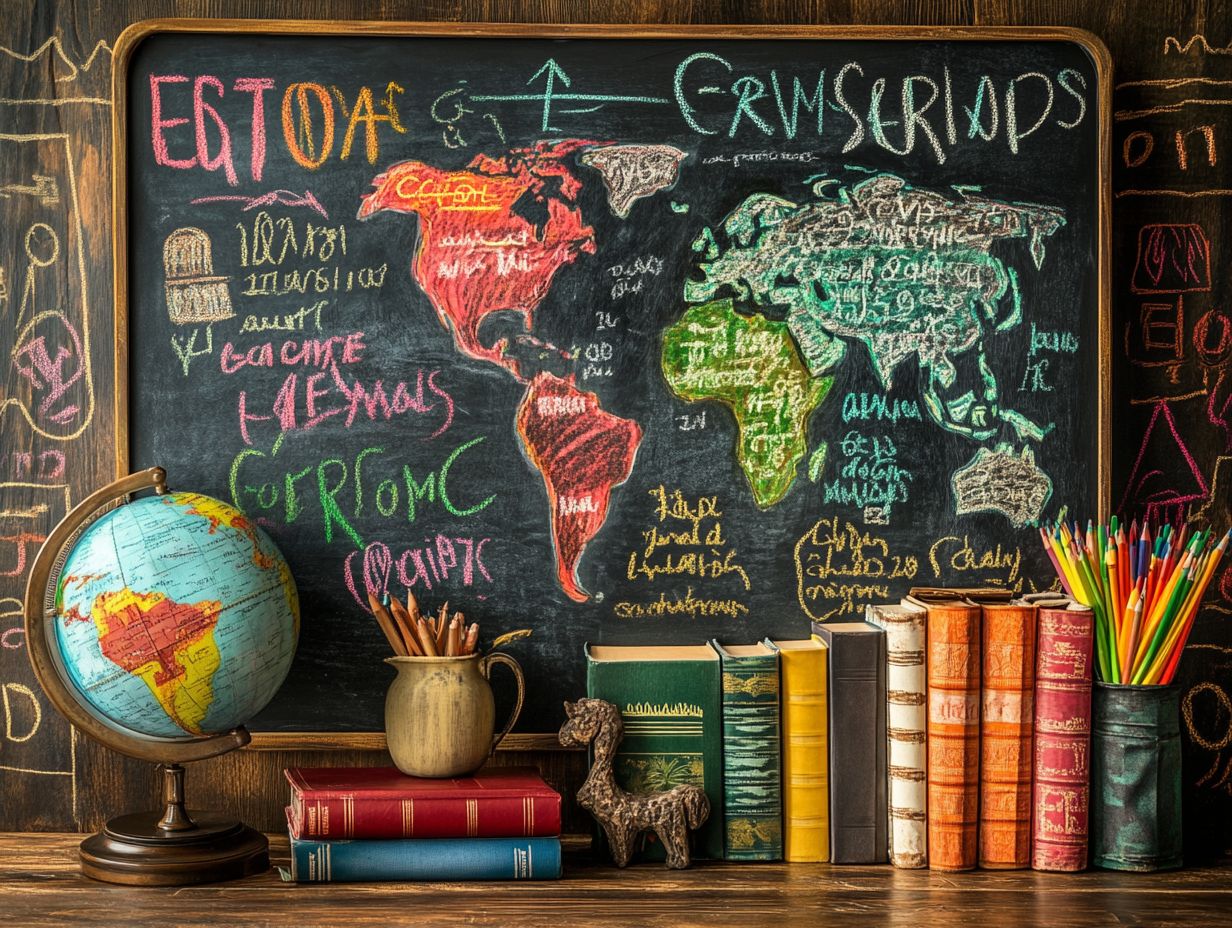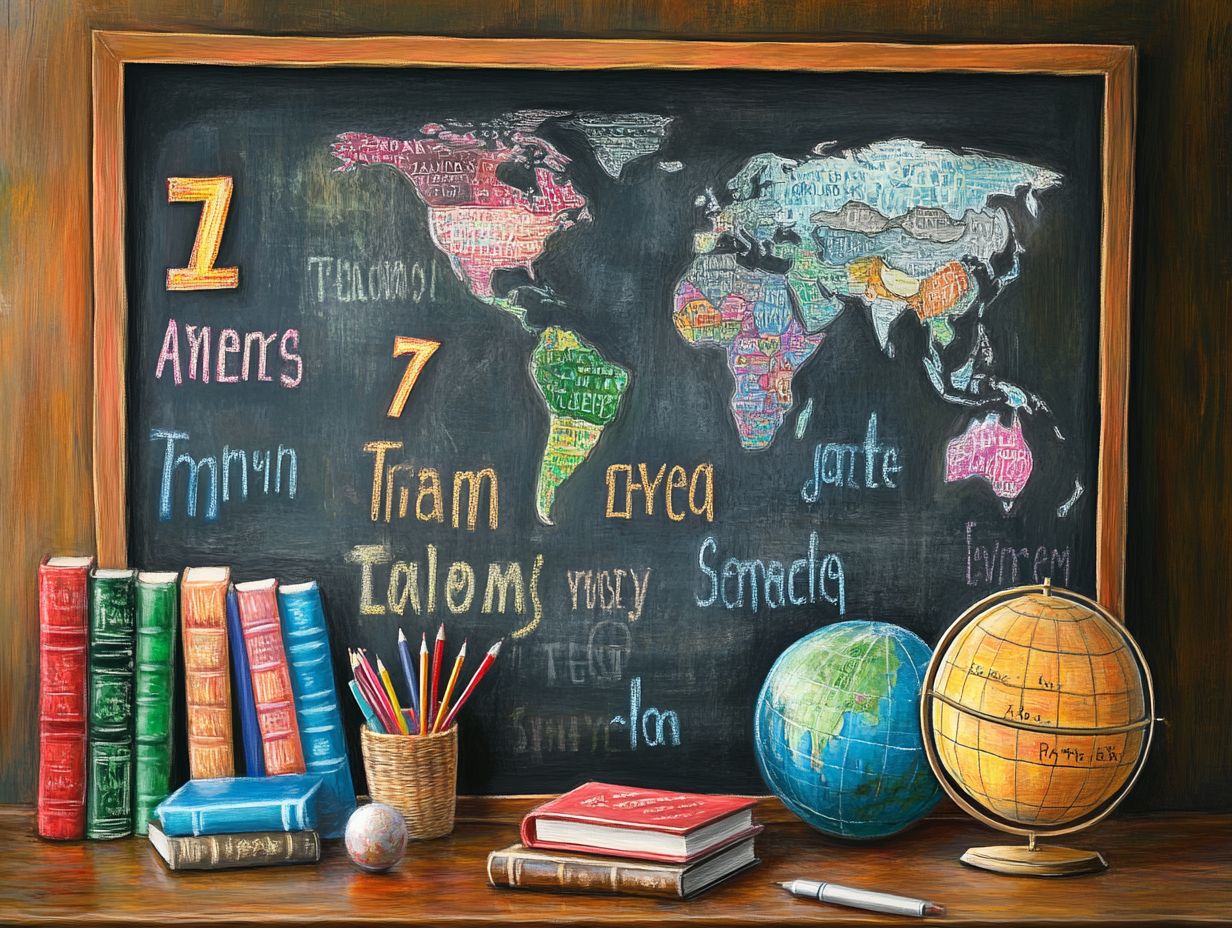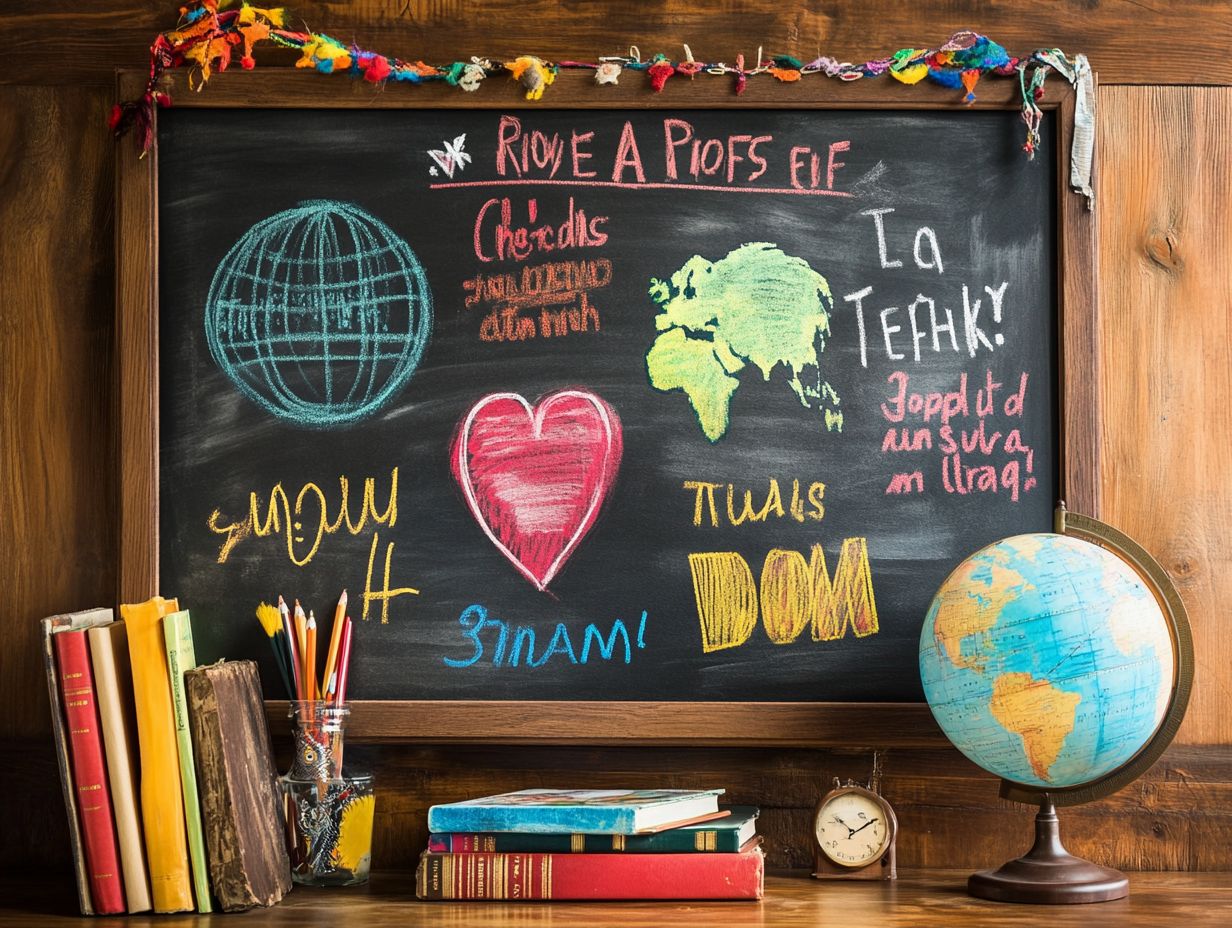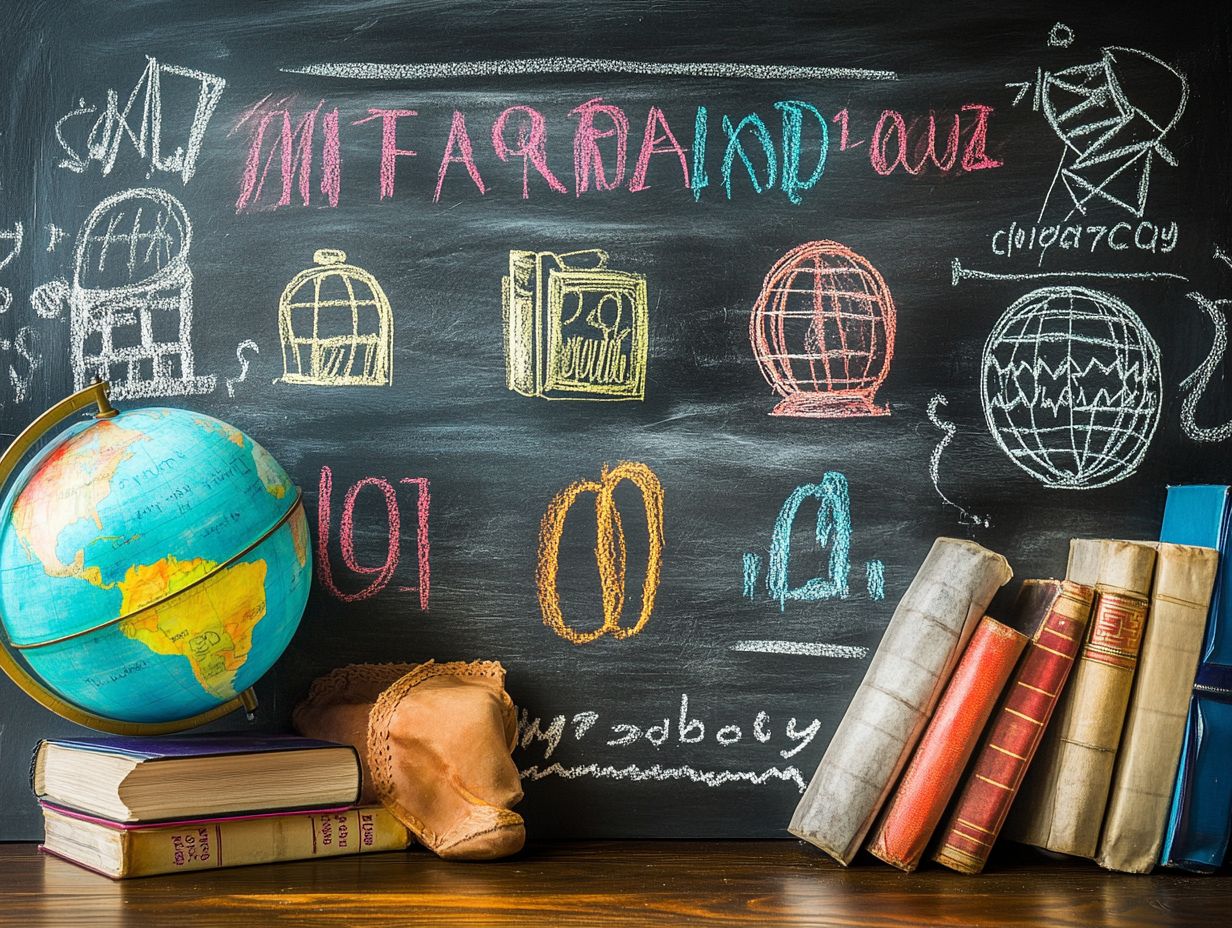7 essential phrases for language learning
Mastering a new language may seem overwhelming at first, but it doesn t have to be! By concentrating on a handful of essential phrases, you can unlock meaningful communication and cultivate confidence in your language abilities.
Consider these seven key phrases from greetings to expressions of gratitude that are invaluable for your everyday conversations. These phrases promote respect and politeness and come with practical tips for practice and additional helpful expressions.
Are you ready to make new friends in a foreign land? Let s dive in!
Contents
Key Takeaways:

Knowing basic phrases like “hello/goodbye” and “please/thank you” can help you navigate everyday conversations in a new language. These phrases also show respect and politeness, helping you make a positive impression on native speakers. It’s important to practice and master these essential phrases to build a strong foundation for language learning and improve communication skills.
1. Hello/Goodbye
When you embark on a journey to diverse regions like North Africa or Costa Rica, familiarizing yourself with essential travel phrases such as ‘hello’ and ‘goodbye’ can significantly elevate your communication with native speakers. This enhances your ability to connect and allows you to immerse yourself in the local culture, minimizing any potential communication barriers during your study abroad or gap year experience.
These phrases act as cultural keys that unlock deeper relationships with locals whether you’re greeting a host at your hotel or exchanging pleasantries with a fellow passenger on a bus. For instance, when you say ‘Salam’ in Arabic or ‘Hola’ in Spanish, you’re not just sharing words; you’re conveying warmth and demonstrating respect for local customs.
On public transit, a simple ‘Excuse me’ or ‘Thank you’ can go a long way in showing politeness, paving the way for more meaningful interactions. Recognizing how to express these greetings in different languages can transform ordinary moments into rich cultural experiences, giving you the power to help you navigate unfamiliar settings with confidence and grace.
2. Please/Thank You
Mastering essential phrases like “please” and “thank you” is crucial for cultivating respectful interactions and enhancing your communication skills, especially when engaging with native speakers across various cultures think culinary arts in Spain or the rich traditions of Arabic-speaking regions.
In everyday dining situations, these phrases are phrases that help conversations flow smoothly, creating a more inviting atmosphere. For instance, uttering “Gracias” in a Spanish restaurant or “Shukran” in an Arabic setting can transform an ordinary meal into a delightful experience.
It signals your appreciation not just for the food but also for the effort and culture that shape it. Such expressions help you build rapport, making it easier to connect personally with staff and fellow diners. This can encourage conversations that uncover intriguing cultural insights or tips on local dishes. Ultimately, this practice enhances your dining experience and nurtures deeper global connections.
3. Excuse Me/Sorry

Using phrases like “excuse me” and “sorry” is crucial for navigating public transit and daily interactions in a foreign country. These expressions make it easier to talk while minimizing misunderstandings and cultural missteps.
In crowded environments think bustling train stations or lively markets such phrases are invaluable when you need to get someone’s attention or politely navigate through a sea of people. For example, you might say “excuse me” to gently maneuver past someone blocking the aisle, creating a more pleasant experience for everyone involved.
Similarly, during emergencies, whether it s a sudden medical situation or a vehicle breakdown, saying “sorry” can convey empathy and urgency, effectively diffusing tension. In Spanish, you would use “perd n,” while in French, “excusez-moi” serves the same purpose. Each phrase carries its unique cultural significance, making them essential for fostering understanding and compassion in everyday encounters.
Start practicing these phrases today!
4. How Are You?
How are you? is more than just a polite inquiry; it s a gateway to deeper conversations and meaningful connections. Mastering this fundamental phrase is essential for anyone eager to enhance their language skills and engage authentically with native speakers while traveling.
Understanding this simple yet impactful question can change how you re perceived socially. It establishes rapport and demonstrates genuine interest in another person s feelings or circumstances. Culturally, responses can vary significantly. For example, in Spain, you might hear C mo est s? which creates a sense of familiarity. In contrast, in Japan, you may encounter the more reserved Ogenki desu ka? a phrase that conveys politeness while maintaining a respectful distance.
To seamlessly integrate this expression into your conversations, practice it in everyday situations whether greeting friends or engaging with baristas. This repetition will make it second nature for you. In doing so, you not only enrich your vocabulary but also build real connections with those around you.
5. I Don’t Understand
Expressing “I don’t understand” is vital for navigating communication barriers, especially in new environments where language learning can be daunting. This simple phrase gives you the power to seek clarification and engage in conversations with confidence.
It becomes invaluable not just in everyday discussions but also in emergencies, where clarity is essential. Imagine finding yourself in a medical situation; being able to articulate your lack of understanding could be a lifesaver. Unfamiliar terminology, whether in technical discussions or cultural practices, can easily lead to confusion. By openly expressing this sentiment, you open the door to more informative exchanges.
Learning some basic translations can be helpful. Utilizing visual aids or apps can bridge those communication gaps you might encounter. By being assertive about your confusion, you foster an atmosphere of patience and support, encouraging others to assist and clarify as needed.
6. Can You Help Me?

“Can you help me?” is an essential phrase for you as a traveler, particularly in emergencies or while navigating public transit. It s vital for effective communication and ensures your personal safety while abroad.
When you find yourself lost in a foreign city or facing a health crisis, this simple request can turn your anxiety into confidence don t hesitate to ask for help!
Whether you need directions to the nearest hospital or assistance with a local transportation system, this phrase opens the door to crucial support. For example, if you misplace your belongings or experience a sudden illness, expressing this need clearly to native speakers can lead to immediate help.
In various languages, similar phrases like ” Puedes ayudarme?” in Spanish or “Pouvez-vous m’aider?” in French highlight the universality of seeking assistance, emphasizing its significance in challenging situations.
7. What Does This Mean?
Understanding various terms and phrases is crucial in your language-learning journey, making the question “What does this mean?” an invaluable tool for travelers like you who wish to expand their vocabulary and communicate effectively with native speakers.
This seemingly simple inquiry unlocks a treasure trove of information, allowing you to grasp not just dictionary definitions but also the cultural nuances that accompany them.
For instance, when you ask about the meaning of a common greeting, you might uncover its significance within local customs perhaps the importance of certain gestures or the subtleties of tone. This deeper understanding can lead to authentic interactions, fostering meaningful connections with residents and enriching your travel experience.
Exploring phrases related to food or traditions can further expose you to local etiquette and values, enhancing your journey and instilling a profound respect for the culture you are engaging with.
Why Are These Phrases Important in Language Learning?
Understanding essential phrases like greetings and polite expressions is crucial for effective language learning. This knowledge improves your experience of being surrounded by different cultures and allows you to communicate with greater confidence while studying abroad or taking a gap year in various countries.
These vital language skills enable you to engage in meaningful conversations and break down barriers. They help you forge genuine connections with locals. When navigating unfamiliar environments, the ability to greet someone or express gratitude in their native language often results in warmer receptions and richer personal experiences, deepening your appreciation for diverse cultures.
Mastering these phrases makes daily interactions easier, whether you re ordering food or asking for directions. It gives you the power to fully immerse yourself in local customs, enhancing your overall journey of discovery and personal growth.
How Can These Phrases Help in Everyday Conversations?

Essential phrases act as the foundation for your everyday conversations, enabling you to connect with local populations, navigate social situations, and enrich your cultural immersion experiences.
For example, when dining in a foreign restaurant, using simple expressions like “Could I have the menu, please?” or “What do you recommend?” can help you establish a warm rapport with the staff, enhancing your overall dining experience.
Similarly, when shopping at a local market, inquiring about prices or negotiating with phrases like “Is there a discount?” not only facilitates transactions but also encourages meaningful cultural exchange.
To master these essential phrases, consider engaging with native speakers through language exchange meetups or online platforms. This approach can significantly boost your confidence and fluency in real-life situations, transforming your travels into truly immersive adventures.
How Do These Phrases Show Respect and Politeness?
Using polite expressions like “please” and “thank you” demonstrates your respect and appreciation, which are essential for building rapport with native speakers and enriching your language skills through cultural immersion.
In various cultures, the nuances of politeness can significantly shape your interpersonal interactions. In Japan, using special titles that show respect, like “san,” acknowledges social hierarchies.
In Spanish-speaking cultures, phrases such as “por favor” and “gracias” go beyond mere courtesy; they form the backbone of amicable relationships. Politeness is not just a linguistic choice; it embodies a cultural mindset that values community and harmony.
You can also foster deeper connections by understanding these expressions, showcasing your openness to learn and respect local customs. This not only enriches your experience but also enhances the beauty of cultural exchange.
What Are Some Other Useful Phrases for Language Learning?
Beyond the basic greetings, you ll find a wealth of phrases that can truly elevate your language learning and communication skills. These gems will enhance your interactions with native speakers in languages like English, Spanish, and Arabic.
For instance, asking for directions, ordering food, and expressing appreciation are vital phrases that facilitate smoother conversations. These expressions not only assist you in navigating unfamiliar territories but also reflect your respect and curiosity about the local culture.
Polite inquiries, such as asking someone s name or how their day is going, can set the stage for meaningful connections. Additionally, familiarizing yourself with commonly used idiomatic expressions will make your conversations more relatable and engaging.
Unlock a more exciting travel experience by mastering these phrases! Ultimately, they will allow you to dive deeper into cultural exchanges and gain a richer appreciation of local customs.
How Can One Practice and Master These Essential Phrases?
Mastering essential phrases demands commitment and practice whether through conversations with native speakers, engaging in language exchange programs, or enjoying hands-on experiences during a study abroad or gap year.
To elevate this learning journey, incorporating dual-language dictionaries can be transformative, offering instant translations and contextual examples that make all the difference.
Engaging in language exchanges, whether face-to-face or online, provides rich opportunities for authentic dialogue and cultural insights that deepen your understanding.
Embrace technology by using apps that promote daily practice; they can significantly boost your confidence and retention.
Regularly revisiting and rehearsing these phrases not only solidifies your memory but also fosters fluency, effectively dismantling communication barriers.
Always remember, the essence of mastery lies in consistent practice, allowing you to adapt and respond naturally in real-life situations.
What Are the Benefits of Knowing These Phrases in a New Language?
Knowing essential phrases in a new language unlocks a world of benefits, from enhancing your communication to cultivating genuine connections with locals, transforming your travel experience into something truly remarkable!
When you can express simple greetings, thank-yous, or even ask basic questions, interactions often become warmer and more engaging.
Imagine this: you ask a friendly local for directions, and suddenly, you’re being pointed toward a charming caf that you would have otherwise missed, leading to unforgettable moments over traditional dishes.
Understanding cultural nuances through language not only bridges gaps but also enriches your appreciation of local customs.
Plus, let s not forget about safety knowing essential phrases can be a game changer in emergencies, helping you navigate challenges more effectively and ensuring a smoother, more secure journey.
These vibrant conversations and new friendships will create cherished memories that linger long after your trip has ended.
Frequently Asked Questions
What are the 7 essential phrases for language learning?
The 7 essential phrases for language learning are “Hello,” “Thank you,” “Please,” “Excuse me,” “I don’t understand,” “Can you repeat that?” and “How do you say…?”
Why are these phrases considered essential for language learning?
These phrases are essential because they are the most commonly used in daily communication and can help you navigate various social situations in a foreign language.
Should I learn these phrases in the language I’m studying?
Yes, it is important to learn these phrases in the specific language you are studying as they may have different meanings or variations in different languages.
How can I practice using these phrases?
You can practice using these phrases by incorporating them into your daily conversations, using them with native speakers, or by repeating them during language learning exercises.
Are there any other essential phrases for language learning?
Depending on the language, there may be more essential phrases, but these 7 essential tools for language learning are a good foundation for any language learning journey.
How long does it take to master these phrases?
The time it takes to master these phrases varies depending on individual learning pace and effort. However, with consistent practice, these phrases can be mastered in a relatively short amount of time!
Start practicing these phrases today for a richer travel experience!





